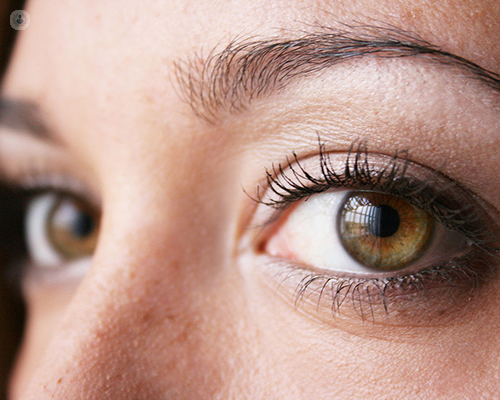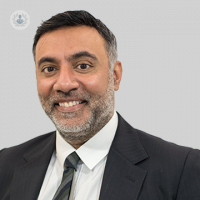Protect yourself against glaucoma: what you need to know
Written by:Did you know that you could have a disease threatening your vision and not even be aware of it? Glaucoma can affect anyone and cause permanent damage to the eye. Mr Vik Sharma, a leading ophthalmologist based at LondonOC, discusses how to protect your eyesight and the treatment options available to those who contract the disease.

What is glaucoma?
Glaucoma is an eye disease which can go undetected right up to the point at which your eyes have suffered permanent damage. Many improvements in glaucoma surgery and treatment have been made in recent years, however, it is still vital that it is detected as soon as possible. The first step towards protecting your eyesight is to understand this disease and how to access the best treatments available.
Damage to the optical nerve from glaucoma eventually leads to a degradation of your eyesight and if not treated promptly, can lead to blindness. Luckily, when detected and treated early, this rarely results in any lasting damage to your vision. Because of this, it is very important that you regularly have your eyes checked by a qualified ophthalmologist.
What are the signs and symptoms of glaucoma?
Before you agree to any treatment, it is important that you understand exactly how this disease damages your eyesight. Most glaucomas are the result of too much pressure in your eye, which then squeezes the optical nerve. However, there are subsets of glaucoma that can be present without any extra pressure and can be difficult to detect. While there are medical conditions and hereditary traits that can increase your chances of having glaucoma, this is a disease that can strike anybody.
In recent years there have been advances in glaucoma detection, which means it can be treated earlier than ever. Many ophthalmologists will conduct a pressure test, but this will only detect the roughly 60% of glaucoma that is directly caused by pressure, so it is necessary to cover every base in their diagnostic testing, in order to detect problems early and give you the necessary treatment. If you are in any doubt about your eyesight, or if you have not had a check-up in a while, you should consider making an appointment. Early detection is the key to protecting your vision.
What causes glaucoma?
Most glaucomas are the result of too much pressure in your eye, which then squeezes the optical nerve. However, there are subsets of glaucoma that can be present without any extra pressure and can be difficult to detect. While there are medical conditions and hereditary traits that can increase your chances of having glaucoma, this is a disease that can strike anybody.
Damage to the optical nerve from glaucoma eventually leads to a degradation of your eyesight and if not treated promptly, can lead to blindness. Luckily, when detected and treated early, this rarely results in any lasting damage to your vision. Because of this, it is very important that you regularly have your eyes checked by a qualified ophthalmologist.
Who is at risk?
Although the disease can affect anyone, things that can increase your risk of developing glaucoma include:
- age – glaucoma becomes more likely as you get older; the most common type (primary open angle glaucoma) affects up to 2 in 100 people over 40 and around 10 in 100 people over 75
- ethnic origin – people of African, Afro-Caribbean or Asian origin are at increased risk of developing certain types of glaucoma
- family history – if you have a close relative, such as a parent, brother or sister who has glaucoma, you are at increased risk of developing it yourself
- other medical conditions – conditions such as short sightedness, long sightedness, and diabetes can increase your risk of glaucoma
How is glaucoma treated?
There are three main ways to treat glaucoma, but not all are equally effective. First of all, in less severe cases eye drops can be used to effectively lower eye pressure. This option is good as it is not invasive, however it is not a permanent solution. Another option that has gained popularity is laser treatment, which is also a non-invasive procedure. Once again, laser surgery is not permanent, lasting on average just a few years before you need to be treated again.
It is usual to try the less invasive options first but often resort to the most effective treatment of all – surgery. The prospect of surgery on your eyes can be scary, however experts may feel that this is the best way to ensure a permanent fix when the less invasive procedures have failed. The surgery itself utilises modern techniques with very small incisions and minimal stitches, meaning you will be back to using your eyes to their full potential as soon as possible.
If you are unfortunate enough to be among the 2% of the population that has glaucoma, do not despair.


